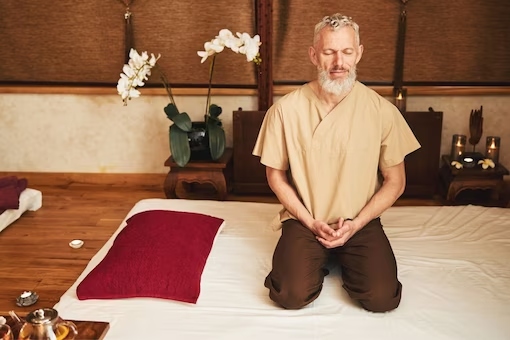Most of you know about the benefits of meditation, right? But we often end up with a bundle of excuses and don’t meditate regularly, especially in the morning. And that’s pretty obvious as most of us don’t get time in the morning owing to our commitments for the entire day. But what if we told you that you could do meditation before going to sleep as well? Yes, you read that right.
Evening meditaion is a great way to unwind after a long day, calm the mind, reflect on what happened during the day and let go of stresses and worries. It allows us to clear our minds of any lingering thoughts or feelings that the day may have triggered. It also allows us to connect with ourselves, reflecting on what we did well during the day and what we might want to improve on the next time. Most importantly, meditating before bedtime allows us to fall asleep faster and better. Knowing the benefits to meditate before bedtime may provide you with the motivation you require to develop a mindful evening routine. So, here are 5 benefits of meditation before going to sleep:
Better sleep
A few minutes of meditation induces a relaxation response in the body, which causes the parasympathetic nervous system to produce melatonin, a sleep-promoting hormone. Melatonin production peaks about an hour before we sleep, so meditating right before bed can help us fall asleep faster and enjoy a deeper, more restful sleep.
Works as a stress-release technique
Meditation aids in the reduction of stress and anxiety. When we are stressed, our bodies release hormones such as adrenaline, cortisol and others that prepare us to fight or flee. When we are stressed for an extended period, our bodies produce even more stress hormones, making us tired and anxious. Because we are often the most stressed at the end of the day, an evening meditation practice is ideal for stress management.
Improves mood
When we are stressed, our emotions run hot and fast. An evening meditation practice can help you clear out the stress of the day and restore balance. As per some studies, meditation also promotes empathy, kindness and compassion for oneself and others. It allows you to see things as they are, without judgement and respond to them with greater wisdom and understanding.
Strengthens relationships
Meditation teaches us to live in a nonjudgmental state, as some studies have claimed. It enables us to see ourselves as others see us and recognise that there is no one correct way to be. Meditation teaches us to accept ourselves and our experiences, even when they appear negative or difficult. This acceptance enables us to open our hearts and feel more compassion for others.
Improves willpower and self-control
Meditation fosters the mental discipline required to break bad habits. It can help you resist temptations and urges like smoking, drinking alcohol, eating junk food and so on. This is especially beneficial at the end of the day when you have less energy to resist these harmful behaviours. Improved willpower indicates that you are less likely to engage in self-destructive behaviour and that you have the strength to establish and maintain new healthy habits.


